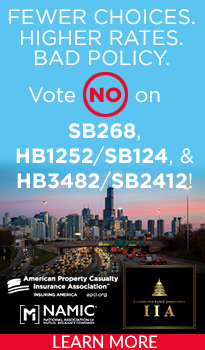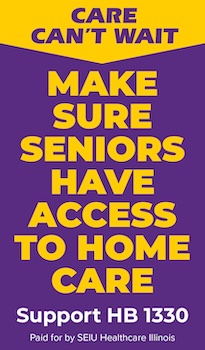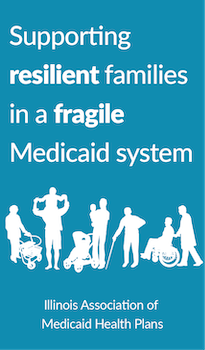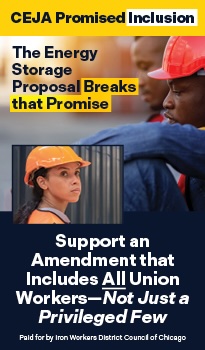Question of the day
Tuesday, May 31, 2022 - Posted by Rich Miller
* Chicago Tribune editorial board…
When we asked Bailey if there was “any daylight at all” between himself and the actions of former President Donald Trump, whom this editorial board long has regarded as pernicious to the future of the Republican Party, he answered “none.” Given Trump’s refusal to acknowledge the legitimacy of the last election, that’s problematic. And, frankly, it is hard to imagine level-headed Chicago Republicans voting for someone who called their city “a crime-ridden, corrupt, dysfunctional hellhole,” all of our self-evident problems notwithstanding. Especially not when the candidate has supported what he calls a “New Illinois” movement, arguing that the rest of the state should separate from Chicago.
“Those of us in rural Illinois have different values and a very different way of life,” Bailey told the political reporter Rich Miller in 2020.
We reject that kind of dangerous, divisive talk and we argue it disqualifies Bailey. Illinois must remain unified. Chicagoans are not different creatures from the rest of the state. Our values have far more in common than Bailey seems to think.
* Sen. Robert Peters (D-Chicago) on WCIA TV...
But I want to also address Darren Bailey, and I think address much of the sort of right-wing views inside our existing parts of the Republican Party, a large part of the Republican Party. The fact of the matter is, dumping on the city of Chicago is not going to make anybody safer, whether they live in southern Illinois, central Illinois or the city of Chicago and Cook County. It’s a fundamental excuse. It is built on a long-standing dog-whistle tradition. And if you want to be governor of the state of Illinois, you have to be governor of the city of Chicago, the governor of Peoria, the governor of Bloomington, the governor of Carbondale, the governor of Champaign, the governor of so many other small towns that exist in the state of Illinois. And your job is to represent everybody. So dumping on a city and playing into the right-wing narratives and the dog-whistle politics of the past isn’t going to make things safer or better for anybody. This is just, again, a long standing tradition, whether it’s coming from some folks in the Republican primary here in Illinois, or whether it’s coming from Governor Abbott, that has existed for decades [including other cities like New York, LA and the Bay Area]. And just like public safety policy over the last few decades, it is built on failure. And so I’m disgusted and annoyed because I want to do whatever we can to make sure that people, no matter their zip code, no matter what part of the state they live in, no matter what part of the country they live in, have the safety, the dignity and the life they deserve. And what we aren’t going to do is build that on the backs of a dog-whistle politics that has been failing us over and over again.
* The Question: Should gubernatorial candidate Darren Bailey’s comments on Chicago be disqualifying? Make sure to explain your answer.
…Adding… Statement from the Bailey campaign…
Senator Bailey has stated multiple times that Joe Biden is the President. We were answering a vague question on what we believed was based on policy where President Trump put Americans, working families, law and order, and taxpayers first. At earlier publicly recorded forums, we were the only candidate who stated we wouldn’t audit 2020, but would instead focus on election integrity measures moving forward. The Board retroactively added the word “actions” into the question to change the meaning. Everyone who answered the question talked about policy. Senator Bailey is a supporter of President Trump and the America First Agenda. He proudly voted for him in both elections, but he is clearly his own man in how he handles himself and sets policy agendas.
…Adding… Also from the Bailey team…
This is a quote from Suntimes from last year and has been Bailey’s stance since the filing.
“Many times when two people are in a relationship or there’s a marriage and someone’s not happy, someone finally says I’m not happy. To me, that’s what that resolution was. It was a warning shot. “I am going to fight to make Illinois stronger from the north to the south from the east to the west as a whole and to make Chicago the great city that it should be,” Bailey said Tuesday. “But unfortunately, it’s being held hostage with liberal terrible ideas.”
65 Comments  
|
* David Roeder…
The job market in Illinois will continue to polarize, with most growth in high- and low-wage occupations, increasing the need for government and the private sector to support work with family-sustaining benefits, a bipartisan task force established by the state Legislature said Tuesday.
The 36-member panel said Illinois could “be a national leader in aligning business and worker needs through defining and enhancing job quality.” It said state government should realign its grants in workforce training and other programs to support jobs with benefits such as health insurance and family leave policies.
The panel’s report sidestepped the issue of mandates on the private sector but called on companies to implement such innovations as “portable” benefits that people can carry from one job to the next and paying workers a subsidy for commuting costs.
* From the Future Of Work Task Force Report…
Summary of key findings and trends Work Challenges
1. Illinois continues to recover from the COVID-19 pandemic but recovery has been uneven. As of April, unemployment is down to 4.6 percent in Illinois, but that number is much higher for Black men and women (13.4 percent and 11.4 percent) compared to other groups, illustrating ongoing challenges with equity and job access. New business openings in Illinois continue to increase, with the rate sitting just below its pre- pandemic baseline.
2. Shifts in the Illinois economy away from manufacturing have translated to a loss of middle- wage jobs and a polarized labor market. Over 95 percent of Illinois workers live in urban areas, and although there are wide gaps in the unemployment rate across urban and rural counties, all areas of the state have experienced a hollowing out of middle- wage jobs.
3. Projections indicate growth in lower-wage and higher-wage jobs, further polarizing the labor market. The loss of middle-wage jobs is expected to continue over the next ten years. This highlights the need for policy innovation and business practices to improve the quality of low-wage jobs and create stronger on- ramps to high-wage jobs.
4. Illinois also continues to see gaps in postsecondary access and completion for Black, Latinx, low-income, and rural students. Bachelor’s degree attainment serves as a launch pad to higher-wage jobs, but equity gaps and the costs of accessing four-year colleges have grown prohibitive.
5. Unionization continues to decline, and non- traditional and gig work continues to increase. Nearly 14 percent of the Illinois workforce were part of a union, a number that has continued to decline. Although gig work is difficult to define and track, national estimates are that 16 percent of the workforce participates in some form of temporary work. […]
Summary of Task Force Policy Recommendations Job Quality, Benefits, and Labor Standards
1. Adopt a statewide job quality measurement.
2. Use a job quality measurement mechanism to award state funding.
3. Extend benefits to more people through models that: a. are not tied to any particular job b. support contributions from multiple employers or clients c. cover any worker, including independent contractors and other non-traditional workers.
4. Create paid leave benefit programs to improve economic security for workers when they need to care for themselves and their families.
5. Encourage employers to expand the scope of benefits to include as much employee support as possible, including defraying costs such as transportation.
6. Fund, pilot, and evaluate co-enforcement strategies in sectors with high instances of violations.
7. Consider enacting retaliation protections and stronger penalties for misclassifying employees.
There’s lots more, so click here to read the full report.
*** UPDATE *** Biz groups aren’t happy…
The business community recognizes that the workforce is its primary asset and taking care of workers in a new post-pandemic environment is a top priority. Talent attraction and retention are essential to success and competing in an ultra-competitive global economy, which is why business groups including the Chicagoland Chamber of Commerce, the Illinois Manufacturers’ Association, and the Illinois Retail Merchants Association are disappointed by the outcome of the Future of Work Task Force Report following a deeply flawed process that undermined efforts to have important conversations about improving work for future generations of Illinois residents.
Established in 2021 to assess the current realities of the state’s economy and labor market amid the COVID-19 pandemic and to identify future trends and practices to address the challenges business and workers face, the Task Force has a legal responsibility to operate within specific statutory guidelines allowing for transparency and public participation. However, since the Task Force began meeting last fall there have been numerous statutory violations, which have been brought to the attention of the Department of Commerce and Economic Opportunity, which was supposed to provide administrative support, as well as Task Force Co-Chairs and members. These violations are particularly troublesome as this report will be sent to the General Assembly with the intent that recommendations will be implemented through potential legislation.
Many of the violations stemmed from a failure to meet specific requirements set forth by the authorizing legislation, including:
· Failure to appoint all Task Force members until after the legal deadlines to do so.
· Several meetings were held before all the required Task Force members were appointed.
· The Task Force routinely failed to provide public notice of meetings by omitting meeting locations and times.
Additionally, the final report to be voted upon was provided to the full Task Force at 6:45 a.m. for a 9:00 a.m. vote on the very same day. While the vote only required a majority of the quorum present it should be pointed out that only 17 of the 35 stakeholders voted to approve the report. Further, while DCEO was required to provide administrative support to the Task Force under the statute, two of the Task Force managers charged with planning meetings, developing meeting subject matter, and deciding who could participate were contract lobbyists. This includes one lobbyist who was paid by the Economic Security Project, raising potential conflicts of interest if the group also provided recommendations for the report. DCEO did not respond to questions about these arrangements.
Most of the report’s recommendations were never discussed and none were approved by the entire committee prior to the compiling of the report itself. Disappointingly, many of the recommendations in the report would harm Illinois’ chances to win on the key future growth industries outlined in the state’s 5-year economic development plan. Despite best efforts for meaningful participation, the business community did not get an opportunity for a full and fair hearing of recommendations because of the process and the conflicts of interest of the task force managers. Because of this, the report is not a legitimate starting point to discuss future legislation.
The pandemic has led to fundamental shifts in business operations for many industries, new ways businesses interact with their customers and clients, and, most importantly, how businesses engage, operate, and build their workforces. While the outcome of this Task Force process was profoundly disappointing, the future of work is a critically important conversation that will continue long past the release of this report and the business community remains deeply committed to improving the future of work for generations of Illinois residents and to working with policymakers on these critical issues.
…Adding… DCEO referred me to a letter it sent to the groups back in February. Click here to read it.
11 Comments  
|
* From last week…
The Illinois Manufacturers’ Association testified before a joint hearing of the House Public Utilities and Energy & Environment Committees today regarding the impact rising energy costs will have on manufacturers and to propose ideas to help ease the pressure.
Manufacturers use one-third of all energy consumed in the United States to produce vital products including food, medicine, furniture and electronics. It is estimated families in central and southern Illinois will soon be paying an extra $626 a year in electricity costs, while manufacturers will likely pay anywhere from tens of thousands of dollars to millions of dollars more in higher electric costs. These added costs come amid rising inflation and a global supply chain crisis already challenging the state’s manufacturing industry. On top of higher costs, concerns about adequate energy supply have led to warnings of potential brownouts this summer, which may force manufacturers to close during peak demand times.
“While it may be too late to prevent higher costs and brownouts this summer, action must be taken now to mitigate ongoing pain for Illinois manufacturers and families already struggling to make ends meet due to rising inflation and economic uncertainty caused by the pandemic,” said Mark Denzler, President and CEO of the Illinois Manufacturers’ Association. “Illinois policy makers can no longer ignore warnings about rising energy costs and decreasing reliability as renewable energy resources fall short of making up for capacity lost as fossil fuel power plants are eliminated. As lawmakers were told today by electric grid operators, capacity pressures are expected to get worse before they get better.”
To address these issues, the IMA suggests the following:
· The General Assembly should require the Auditor General to conduct an immediate audit of Illinois’ Renewable Portfolio Standard to understand why the state has routinely failed to meet its goals. Created in 2007, the first goal was set at 20 percent renewables by 2020, and later amended in 2016 to 25 percent by 2025, and again was changed last year to 40 percent by 2030. As it stands, renewables make up less than 10 percent of the state’s energy supply. After spending billions of dollars, Illinois should be better positioned.
· The state should immediately task the Illinois Commerce Commission with the creation of a Resource Adequacy Plan to better understand where we stand and where we are headed. This commission should gather generators, utilities, the business community, and other stakeholders to explore our baseload capacity needs and supply. This is important because Illinois will have shed 6,910 MW of electricity between 2011 and the end of 2022. This capacity has not been replaced, and MISO grid operators have testified they expect to lose one-third of their baseload capacity in the next two years. Illinois cannot make informed energy policy decisions unless we have a clear vision of the issue.
· Some steps may be possible to ease the immediate pain. This includes amending the Clean Energy Jobs Act to redirect the $180 million in Energy Transition Funds to offer rebates to customers to offset these higher costs. These funds should be provided to all customers – residential, commercial, and industrial based on their pro-rated share of the higher costs.
· Illinois has four plants scheduled to close in 2022 – two in June and two in December. While MISO does not have the ability to require these plants to remain operational, Illinois should work with the operators, FERC, and others to encourage these plants to remain open and approve new gas plant operations such as the one proposed in Pawnee to help ease energy supply concerns.
Manufacturers are leading the way in finding innovative ways to harness energy, with pioneering companies developing new technologies that make energy more affordable, reliable, and cleaner with every passing year. Over the last decade, the nation’s manufacturing sector has reduced emissions by 21 percent while increasing economic output by 18 percent. But manufacturers, our communities and Illinois families need stability and certainty moving forward. The manufacturing industry stands ready to work with policy makers to find solutions.
* I asked a couple of groups for their responses. Here’s Jack Darren at the Sierra Club…
The unfortunate price spikes coming to Ameren customers this fall are the result of global market volatility caused by Russia’s war on Ukraine, and national and regional trends away from aging, dirty coal plants. Thank goodness Illinois passed the Climate and Equitable Jobs Act in 2021 to put us on a path to independence from fossil fuels and these price spikes by ultimately building 100% of the power supply Illinois will need right here in Illinois, built by our workers earning good wages. Illinois is now better situated than most states for the long term because we have a funded, long-term plan in place to make us independent of and resilient to these spikes in fossil fuel prices.
To dismantle our nation-leading energy plan for the future now, just as Illinois is beginning to implement it and employers from around the world are beginning to invest in clean energy projects here, would be an historic mistake that would recommit us to the dependence on fossil fuels and future price shocks. Defunding CEJA’s equity, workforce development, and just transition programs for coal communities to make payments to large businesses would be a giant step backward to the days when our energy policies were dictated by lobbyists and communities and consumers paid the price.
We do need action this summer to help consumers deal with the rising costs of fossil fuels. Ameren can expand energy assistance programs to help more customers directly, and energy efficiency and demand response programs that are doubly effective, helping participants reduce use and lowering market prices by reducing peak demand. Ameren can speed approvals for the thousands of megawatts of solar projects ready for construction, and MISO can approve new transmission capacity to help get clean energy online faster. We’re ready to engage with stakeholders on these and other solutions that can expedite Illinois’ transition to a clean energy future, and the protections that will deliver for consumers and future generations.
* And here’s the Illinois Environmental Council…
The Illinois Manufacturers Association has put forth proposals that are designed to both exacerbate the impacts of climate change and expand the racial wealth gap. Neither of those is the right direction for Illinois. At the hearing Thursday, the regional grid operator testified that there are enough CEJA-enabled renewable energy projects waiting in the queue for approval to avoid any price increases driven by reliability concerns. Instead of going backward, we should be focused on getting those job-creating projects built in an equitable way.
…Adding…. Media advisory…
In partnership with the Illinois Clean Jobs Coalition, several community organizations will be hosting a rally and press conference on Wednesday, June 1 to call on Ameren to take action to protect consumers and the power grid across Illinois. Communities in Central and Southern Illinois are facing rising electricity costs as a result of Putin’s invasion of Ukraine, Ameren’s resistance to programs that save on energy, and efforts by fossil fuel companies to slow the transition to affordable, clean energy. Environmental, consumer, and community advocates with the Illinois Clean Jobs Coalition will rally together to demand that Ameren take meaningful action to empower consumers to utilize policies enshrined in the Climate and Equitable Jobs Act (CEJA) to generate enough power to meet peak demand for electricity while also delivering power at a reasonable cost to consumers and small businesses.
WHEN: Wednesday, June 1, 2022 at 10:00 AM Central Time
WHO:
Scott Allen, Citizens Utility Board
Sangamon Valley Group of Sierra Club Illinois
Faith Coalition for the Common Good
WHAT: Rally and press conference calling on Ameren-Illinois to act swiftly to protect Illinois customers and our electric grid amidst rising electricity costs
WHERE: Ameren-Illinois Offices, 200 W Washington Street Springfield, Illinois 62701
14 Comments  
|
* The Belleville News-Democrat asked gubernatorial candidates: “Who are your top three campaign contributors?” Here’s Richard Irvin’s response…
We have three main contributors to our campaign to take back our state: people who tell us we have their vote, people who volunteer to put up signs or make phone calls to get our message out, and people who contribute financially to help us fight back against the millions of dollars. J.B. Pritkzer and his Democratic allies are spending on false TV ads attacking us. I’m proud to count Troopers Lodge #41, the Illinois FOP Labor Council, the Chicago FOP, the Aurora police union, and countless law enforcement leaders around the state as supporters of our campaign. I’m also proud to be supported by former Congressman John Shimkus and many other conservative leaders around Illinois.
Apparently, Ken Griffin is the man who must not be named.
…Adding… The Daily Herald endorsed Irvin, but with one caveat, and it was directly related to Ken Griffin…
Two additional candidates round out the primary field, Gary Rabine, a highly successful owner of multiple businesses from McHenry, and state Sen. Darren Bailey, a farmer from downstate Xenia whose career in the legislature was most noted for his expulsion from the House floor when, then a state representative, he refused to abide by rules at the height of the pandemic requiring all members to wear face masks.
Be aware: We are not indifferent to the optics or the complications posed by Irvin’s well-publicized, well-financed backing by Illinois’ richest person, hedge fund manager Ken Griffin. Irvin still has far to go to prove that he is indeed his own person, willing to lead according to the dictates of his own conscience and insights and not those of a well-heeled financial backer.
But we hope he gets more opportunity in a broader campaign to show his full personal political profile.
…Adding… The Tribune endorsed Paul Schimpf (I did not make that up), used a quote from my publication to disqualify Bailey from consideration and had this to say about Griffin and Irvin…
As politically engaged Illinoisans, Griffin and Uihlein are entitled to spend their money as they see fit. But we see troubling issues with both of their preferred candidates. […]
But we’re troubled by what occurred when Irvin arrived on the scene while officers were arresting his then-girlfriend, accused of hitting a security guard at a marijuana store last year. According to a police report, he said that the charges would be “taken care of.” He’s insisted he meant that the woman would be afforded an attorney but we’ve heard phrases like “taken care of” a few too many times before in Illinois politics and we need a better explanation.
We’re similarly troubled by Irvin’s frequent reticence when it comes to being frank with the media (although he did show up for us and answered our queries), his sometimes prickly temperament in the face of fair questions, and by a lack of a consistent worldview that could appeal to moderate Democrats and Republicans looking for a common sense candidate they can trust to safeguard their economic futures and solve some of the state’s problems.
If Irvin is willing to separate from Trump and appeal to moderate, common sense voters, including centrist Democrats, he should find the courage to say so, clearly, without weaving and dodging, flip-flopping and hedging his bets.
39 Comments  
|
|
 Support CapitolFax.com
Support CapitolFax.com
Visit our advertisers...

 ...............
...............
 ...............
...............
 ...............
...............
 ...............
...............
 ...............
...............
 ...............
...............
 ...............
...............
 ...............
...............
 ...............
...............


|
   
|
Hosted by MCS
SUBSCRIBE to Capitol Fax
Advertise Here
Mobile Version
Contact Rich Miller
|



















